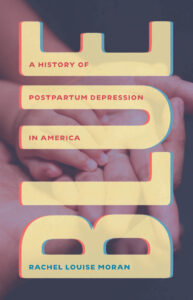AlumnX Dr. Rachel Louise Moran publishes new book on history of postpartum depression
WGSS AlumnX Dr. Rachel Louise Moran published her new book, Blue: A History of Postpartum Depression, this October.
New motherhood is often seen as a joyful moment in a woman’s life; for some women, it is also their lowest moment. For much of the twentieth century, popular and medical voices blamed women who had emotional and mental distress after childbirth for their own suffering. By the end of the century, though, women with postpartum mental illnesses sought to take charge of this narrative. In Blue: A History of Postpartum Depression in America, Rachel Louise Moran explores the history of the naming and mainstreaming of postpartum depression. Coalitions of maverick psychiatrists, psychologists, and women who themselves had survived substantial postpartum distress fought to legitimize and normalize women’s experiences. They argued that postpartum depression is an objective and real illness and fought to avoid it being politicized alongside other fraught medical and political battles over women’s health. Based on insightful oral histories and in-depth archival research, Blue reveals a secret history of American motherhood, women’s political activism, and the rise of postpartum depression advocacy amid an often-censorious conservative culture. By breaking new ground with the first book-length history of postpartum mental illness in the twentieth century, Moran brings mothers’ battles with postpartum depression out of the shadows and into the light.
“ . . . . a nuanced, perceptive, and empathetic history of postpartum mental health activism.”— Lara Freidenfelds, author of The Myth of the Perfect Pregnancy: A History of Miscarriage in America
Blue can be purchased now from the University of Chicago Press.
Rachel Louise Moran is an associate professor of history at the University of North Texas. She completed her PhD in History and Women’s, Gender, and Sexuality Studies at Penn State. Moran is the author of Governing Bodies: American Politics and the Shaping of the Modern Physique.
Congratulations, Rachel!
